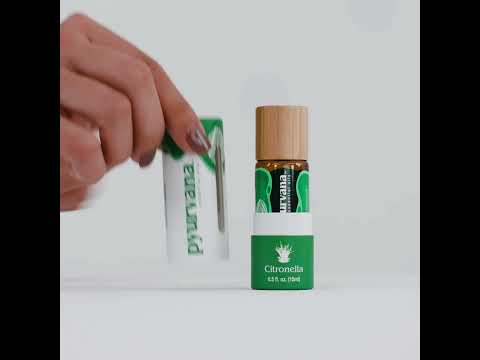Citronella Oil – 15ml
Citronella Oil – 15ml
Couldn't load pickup availability

Citronella oil is much more versatile than you may expect. Similar to lemongrass, its scent is light, crisp, and uplifting.
More Information


What is Citronella Oil?
Citronella plants are a type of grass in the Cymbopogon genus. Lemongrass is in the same genus, so the two plants are very similar. The main difference is that lemongrass is entirely green whereas citronella has some reddish pseudostems. The two main varieties of citronella are Cymbopogon nardus and Cymbopogon winterianus. We use the species Cymbopogon winterianus, also called Java citronella after its place of origin. This is because this plant generally has a higher concentration of citronellol, the chemical compound that repels mosquitos and other insects.
Citronella, along with lemongrass, has been used in natural medicine for centuries in Indonesia, China, and Sri Lanka. It is also an ingredient in many recipes from the region. The oil was first introduced in London in 1851.
In order to obtain concentrated citronella oil from the Cymbopogon winterianus, we use steam distillation. To do this, the grass is collected in a large container which is then injected with steam. This vaporizes the aromatic compounds in citronella. The vapor is then condensed and the essential oil is separated from any water and purified.
Complementary Scents
The citrus notes of this essential oil make it a great pairing for scents such as lemon, orange, grapefruit, and bergamot. These blends will generally be light and energizing. Citronella oil also pairs well with floral fragrances like ylang ylang or lavender. You can also blend it with herbal aromas such as rosemary or clary sage.
Primary Benefits
Citronella is very versatile and has many uses. One benefit is that it is an excellent deodorizer. You can make your own deodorant by mixing it with baking soda, coconut oil, and other essential oils such as lemon, tea tree, or eucalyptus. Using citronella oil spray in a room or diffusing it creates a clean and pleasant aroma.
Diffusing cinnamon oil can give your home an uplifting and inviting scent. Many people find that it lifts their mood and energizes them. This is especially true if you have fond memories of baking with cinnamon or other positive associations with the aroma. The fragrance may also act as a natural aphrodisiac. In aromatherapy, citronella is thought to improve your mood and enhance your concentration and mental clarity. Its clean and crisp scent gives your home an energized feeling and it is an especially great pick-me-up if you diffuse it before or after cleaning.
How to Use Citronella
To diffuse citronella, add a few drops to your diffuser. Make sure to follow any specific instructions for operation. If you are adding other oils, use only one or two drops of citronella. Make sure not to add too much of any essential oil as the scent may become overpowering.
For topical use, always mix pure essential oils with a carrier oil to avoid irritation. Keep in mind that some people are more sensitive to the compounds in this and other oils. If you notice any adverse effects or you have signs of a skin allergy, contact your doctor immediately and discontinue use.
Cautions
Citronella can sometimes increase photosensitivity, so be sure to wear sunscreen and try to stay in the shade when possible after using this oil topically.
All pure essential oils must be diluted with a carrier oil to avoid damaging your skin. Also avoid sensitive areas such as around your eyes, nose, or ears. Proper dilution is especially important with citronella oil as in addition to irritating your skin, high doses of topical citronella can cause a rapid heart rate. If you have any symptoms of this, immediately seek medical attention.
Keep out of reach of children.
If you are pregnant, nursing, or under the care of a physician, consult your health care provider before using citronella or any other essential oil.
This essential oil is for external use only and should not be ingested.
Pure essential oils are flammable and should be stored in a cool, dry location away from any open flames or excess heat.
What's Trending
-
 50%
50%
OFFBergamot Oil – 15ml
Regular price $11.50Regular priceUnit price / per$23.00Sale price $11.50Sale -
 50%
50%
OFFCinnamon Oil (Bark) – 15ml
Regular price $10.00Regular priceUnit price / per$20.00Sale price $10.00Sale -
 50%
50%
OFFCinnamon Oil (Leaf) – 15ml
Regular price $12.00Regular priceUnit price / per$24.00Sale price $12.00Sale -
 50%
50%
OFFCitronella Oil – 15ml
Regular price $7.50Regular priceUnit price / per$15.00Sale price $7.50Sale -
 50%
50%
OFFClary Sage Oil – 15ml
Regular price $15.00Regular priceUnit price / per$30.00Sale price $15.00Sale










